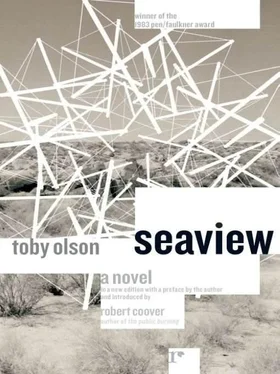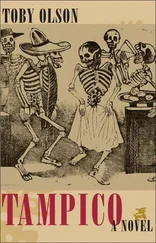When they got back to their rooms, Melinda said she was very tired and thought it would be a good thing if she slept alone that night. Allen said he thought they could arrange that, and maybe she should take Bob White’s room and bed, and he and Bob White could sleep together in their room. They did that, and though the walls were thin, Melinda wept very quietly in Bob White’s bed, and Allen did not hear her. And though Allen was very tired, Bob White lay so still beside him that he kept feeling and listening for movement and breath, so it was a long time before he was able to fall asleep.
Early in the morning, at the beginning of first light and while they were still sleeping, Melinda got up and went back out to the whale’s jaw and the sea course. She was in her bathrobe and slippers, she was too intent to notice the way the day changed the look of things, and she stepped carefully down between the sea figures, retracing the way to the dolphin. When she got to the dolphin’s side, she saw that the small pocket was empty, the bird was gone. She went back to the room, and when the three were sitting together having coffee in Bob White’s room later, she mentioned to them that she had gone out and that the bird was no longer there.
“What do you think?” she asked Bob White.
He looked at her, hesitating a moment before answering, thinking that he could lie to her. But then he thought that the lie would be feeble, and also that to lie to her would be the wrong thing to do. And he said:
“I do not think that bird has come to a good end.”
THERE WERE TWO PICTURES HANGING IN THE CLUBHOUSE, side by side, on the wall behind the glass case. The one on the left, put up with tape and brown and peeling at the edges, was a mock blueprint rendering of an eighteen-hole course, and scribed in between the lines denoting the location and shape of the new clubhouse were the words Seaview Links Proposal and below that Baron Associates / 1955 . The other was an old and faded photograph, about a foot square, in a glass frame. It was a picture of the seventh green, taken from the fairway close in front of it, with the lighthouse in full view in the background. Four men, all of them in baggy knickers and jaunty tams, stood on the green. One was tending the flagstick, while a second addressed a putt of about fifteen feet. The other two stood to the side, both with hands on hips, each with one foot planted a little ahead of the other. Off the green to the right stood a fifth figure, more faded than the others. It was hard to tell what he was wearing, not golf togs surely, but his posture was very erect and formal, and he seemed not to be in anyway involved in the proceedings. He was looking away from the green in the direction of the camera. On the sur — face of the glass, in felt-tip marker, various hands had drawn little arrows pointing to the figures, and there were names and statements beside the arrows: Fred Borker considers a putt, The Chair watches critically, John Hope holds stick .
Around the head of the figure standing off the green, a small feathered headdress had been carefully inked in, and beside the arrow pointing to the figure were the words, Chief Wingfoot’s Revenge! and then, in very small parentheses, Chip . A white card had been tacked below the photograph, and typed on it were the words Seaview Links, One of the oldest courses in America. Continuous play since 1892. Above photograph, 1920 .
Sammy winked at the photograph and the blueprint, as he did most mornings when he came in to open up. Barefoot, in old jeans and a worn madras shirt, he moved behind the glass counter to the old cash register, pushed the “No Sale” button, and gave the handle a crank. The bell rang and the door slid open. He saw that there was plenty of change, enough for the traffic of the first major tournament of the summer. He closed the door and went around the counter to the stove in the kitchen area. The clubhouse was small and L-shaped. Where the two rectangles joined, and across from the door, was the glass case, about four feet long, containing balls, tees, and gloves. To the left of the case, at the end of the building, was the kitchen: a large refrigerator, formica counter and stove, a sink, and a card table. Behind the glass counter, filling the shorter rectangle, was Sammy’s golf gear concession: a few windbreakers, a couple of sets of clubs, various hats and other golf equipment. Windows in the back wall of the concession overlooked the short ninth fairway and beyond that the longer, par-four eighth. Sammy fiddled with the percolator, got it loaded and on the fire, and then went to the concession room to get his hat, a large crumpled fedora he liked to wear because it kept his long hair from getting in his eyes and because it kept the sun out, but most of all be-cause he liked the way he looked in it. He put it on and scratched the wispy hairs of his untrimmed beard.
“Right on time,” he said aloud. He could see across the eighth fairway, about a hundred yards from the clubhouse, big Chief Wingfoot walking stiffly toward him. The Chief moved very methodically, and such was the monotony of his gait that he was almost upon the terns pecking in the fairway before they were aware of him and rose up in little flashes of white (it seemed from this distance), right in the Chief’s face. Sammy saw the Chief stop, pick something up and study it for a moment, and then get back into his gait. He was walking the trail of the underground river, Tashmuit, that cut across and under the fairway, turning near the clubhouse and heading for the sea. The grass was greener where the river ran, and when it swelled up in winter, it was visible as a slight ridge. Even in summer, its strength was notable. The ground was soft-er above it, and the attentive could feel it pulsing under foot. He called it People’s River when he had occasion to speak of it, keeping its ancestral name to himself. It was where the people had come for their water. They could walk to it when they had need. It was out of the way for him, but he used its path when he entered the golf course at most times. It gave him strength in its place as evidence and a time for thought to renew his purpose. When it turned seaward he quit its path and headed toward the clubhouse.
Though it was early July, the morning air was crisp and cool; there was plenty of dew on the spare grass of the eighth and ninth, and the white brick of the lighthouse shone like a new dime in the morning sun. Sammy poured the hot coffee into two stoneware mugs marked Seaview Air Force Station, with a little emblem on each, and went out to where the Chief was sitting on the transplanted park bench overlooking the ninth green.
“Good morning, Chief. Coffee,” Sammy said, and handed him one of the mugs.
“Hey,” the Chief grunted. “Feather,” and he handed Sammy the clean white tern feather he had picked up.
“That’s a fine feather,” Sammy said, holding it up in the sun. He took his fedora off and plugged the root of the feather into the band so that it stood up straight along the crown.
“What a fine day!” Sammy said. And he and the Chief sat on the bench together, sipping at their coffee and looking out across the fairways and into the rough grass beyond.
The road that ran in front of the clubhouse separated the seventh fairway and the rest of the course behind it from the eighth and ninth. It ended in a cul-de-sac parking lot right in front of the lighthouse. The lighthouse perched on the edge of the high dunes, a hundred feet or so above the narrow beach, with the Atlantic Ocean beyond it. Earl Sawgus chugged his pickup truck along the road, saw as he usually did the backs of Sammy and the Chief on the park bench, went the hundred yards to the parking lot, turned in a slow circle, enjoying the condition of the seventh green and the eighth tee, came around and back down the road, and parked along the side of the clubhouse.
Читать дальше












